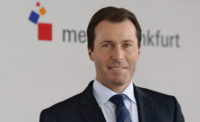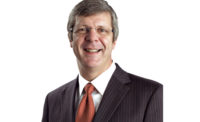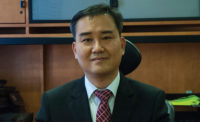pme interviewed Liberty Pumps President and CEO Charlie Cook in October in his office in Bergen, N.Y., about his company and issues facing the plumbing industry. Cook joined Liberty Pumps in 1972 as a design engineer and has led the company since 1975. His uncle, Fred Cook, founded the company in 1965. Cook’s daughter, COO and Manufacturing Manager Robyn Brookhart, will succeed him as president.
pme: In your career at Liberty Pumps, what innovation in pump technology has made the greatest impact?
CC: A couple changes have been around such as vortex impellers to make it easier to handle solids and magnetically-actuated switches to take away a potential leak path. But probably the biggest impact has been the integrated package pump system that incorporates alarms with serviceability features built into it. That important innovation is still continuing.
The proliferation of grinder pumps is another big one. Grinders have been around for quite a while, but it’s only in recent years they have become the go-to choice for installations because of the difficulty in moving some solids in current waste streams.
pme: What other innovations in pump technology excite you the most?
CC: Lately, I think the exciting technology is connected products. We are already going down that road with our NightEye alarm system. The potential is huge in monitoring and even predictive maintenance of pumps by being able to transmit details of how the pump is operating.
pme: How involved are you with the new technology in your pump systems?
CC: For any new product, we have a sign-off process that I get involved in, and I’ll sit in meetings where it’s appropriate. I am certainly not involved in the day-to-day design work as I once was. I think the last pump that I actually designed myself would have been in the late 1980s. And while I have a good grasp of what our engineering staff is achieving and how things work, I am not the guy who actually puts the lines on the computer monitor. I do marvel at what they end up with.
pme: What do you know now about leading a company that you wish you knew in 1975?
CC: In the early years, of course, I was just scrambling day-to-day to get things done. We were a small company. When I started, there were only seven of us. So we did what we had to do. I didn’t know it at the time, but the key thing is the emergence of our company culture. The foundation for that began to be set back then. That culture is really the seed of the way we operate today.
In addition to respect for the customer, which I think everyone here has, we have a strong focus on respect for our members, our own people, and the contribution each of them makes toward our success. It’s really kind of fun to go through the plant to see their intensity to process an order, make sure it’s accurate and that it’s shipped in a timely way. Those are the kind of things that I think are really behind our culture. Beyond that, the level of service we give to customers during and after the sale, that’s a really strong focus for us.
pme: Have you set your retirement date?
CC: There is really no need for me to retire per se, so my intent is to phase myself out, gradually.
My job mostly consists of enabling people to do their job and getting them what they need to do their work. Every department is extremely well-run. And, getting back to our culture, everybody who reports to those people just knows what the expectations are and they perform. It’s just an excellent situation.
pme: How will the leadership at Liberty Pumps be structured after you retire?
CC: It doesn’t really change that much. Robyn will transition into the position of president. She already has selected her replacement as manufacturing manager. I would probably remain CEO until everyone was comfortable with the next phase. But as far as the structure of the company, nothing’s really going to change.
pme: What advice will you give to the next generation of leadership at Liberty Pumps?
CC: Maintenance of culture is a big deal. All the managers here, and especially Robyn, are very much in tune with that. When we go through our strategic planning very year, we spend a lot of time on what it takes to maintain our culture as we grow. We have many people here who come from various backgrounds. Sometimes it takes several months or even a couple years for them to appreciate the fact that they can express their ideas and come up with improvements that they can put forward.
It’s almost an expectation that they are going to participate in this way. And it’s kind of fun. Every month when we have our members meeting, we usually acknowledge a dozen or 15 of them and thank them for their suggestions.
pme: What has the recent expansion of your facilities allowed your company to do?
CC: The most obvious is simply manufacturing capacity. We ran out of room in future capacity because we have a steady stream of new products that are always coming on board, and they all require areas for us to build them. They also require additional space for the support inventory.
We also significantly expanded our R&D area. We previously just didn’t have the facilities to do certain kinds of testing. And, we expanded our machine shop and added another powder-coat paint system.
We did have a training center here that was adequate for small groups, but we really needed something more impressive because the customers we’re attracting these days are all the ‘A’ players in the industry. We want to make sure we adequately train them when they come in. This year we’ve already had over 300 visitors. Probably half have been distributors and the other half contractors. We’ve not had an extreme number of engineers, but that number will grow.
pme: What commercial/nonresidential applications will grow in importance for your products?
CC: We see huge opportunities and we’ve been very active for years with our engineered pump systems. EPS is a rapidly growing segment of the company mostly in commercial applications such as restaurants and motels.
The nice part is that customers actually design their systems. We’ll draw up their design ideas, show them the drawings and get their sign-off. Whatever they want in the EPS, we can accommodate, whether it’s tank size, inlet discharge location or the number of pumps.
And we can get a drawing to them in a matter of hours. We’re well-known for very quick turnarounds on quotes and drawings.
pme: What do you see as Liberty Pumps’ most distinguishing feature?
CC: Without question, it’s our level of service. Between being able to process orders quickly and accurately and our phone response if customers have an issue, our service is better than anybody’s in the industry. We have a live person answering the phone, we have extensive technical customer service staff here, and we just bend over backwards to make sure the customer gets a quick and useful response to whatever the issue might be.
pme: If you had one piece of business advice to give to engineers what would it be?
CC: I think they would really benefit from increasing their professional knowledge of products and use of technology and the professionalism with which they do their work. I’ve always admired electricians, for example. They come in and every wire is straight through the whole basement. And the same with plumbers, where there isn’t one pipe out of plumb. Everything is done perfectly. And then it’s their responsiveness to customers because that’s what keeps customers coming back. It isn’t the price, after a while, it’s really about whether customers can count on that contractor being available if they ever have an issue.





